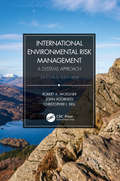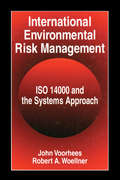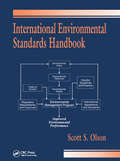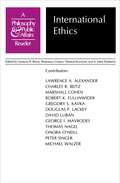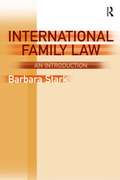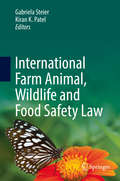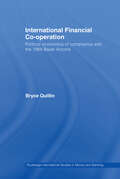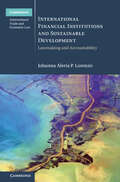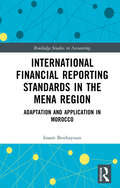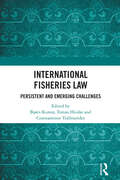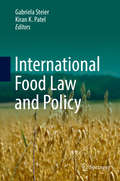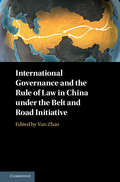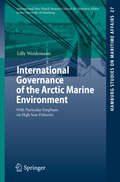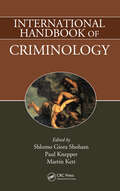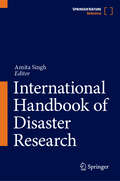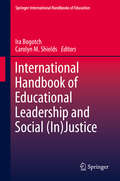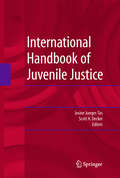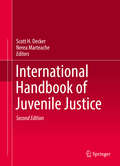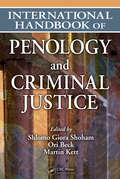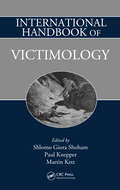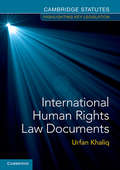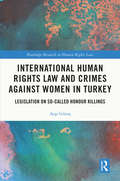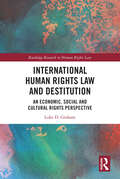- Table View
- List View
International Environmental Risk Management: A Systems Approach
by John Voorhees Robert A. Woellner Christopher L. BellBased on the first edition with extensive analysis of practical applications of environmental risk management and compliance management systems, this second edition of International Environmental Risk Management reflects updates made in the understanding and application of risk management best practices and makes available a frame of reference and systematic approach to environmental and social governance (ESG). It provides a pathway for readers to implement environmental management strategies that can be integrated with core operations and other risk management efforts, including supporting sustainability and corporate social responsibility initiatives associated with climate change, the circular economy or supply chain conditions, as well as enterprise risk management; anti-bribery, and other compliance management systems. This book provides in-depth discussions of ways to use global environmental management standards. New features in this edition: Combines EMS standards with discussion of specific principles, other authors’ research, and guidelines on management practices. Provides guidelines on how to prepare for, anticipate, and resolve environmental issues. Includes easily understandable information for all readers and is not simply aimed toward individuals who are knowledgeable about this topic. Provides in-depth discussions on using global environmental management standards to manage risk and promote resilience, as well as legal strategies and voluntary initiatives that companies can utilize to minimize risk. Accounts for the substantive revisions in ISO 14001:2015. As a growing and rapidly changing field, it is necessary to address new issues, guidelines, and regulations to assist businesses, academia, students, consultants, lawyers, and environmental managers with a pragmatic resolution to environmental risk management issues. This second edition gives a broad and detailed analysis of the changes made to international standards and practices and serves as an excellent guide to managing environmental risk.
International Environmental Risk Management: ISO 14000 and the Systems Approach
by John Voorhees Robert A. WoellnerInternational Environmental Risk Management: ISO 14000 and the Systems Approach gives readers an extensive analysis of practical applications of ISO 14000 and environmental compliance management systems. It offers a mixture of technical engineering advice, legal guidance, and common-sense business acumen. The authors explain the essentials of the standards - how they are being developed and what implications they present - and then discuss cost-benefit analyses, integration strategies, business risk control measures, litigation avoidance and legal expense reduction, and step-by-step guidance on achieving third-party certification.
International Environmental Standards Handbook
by Scott S. OlsonLack of knowledge about, and noncompliance with, international standards can result in loss of sales and partnership opportunities as well as possible legal action. The International Environmental Standards Handbook provides the necessary historical background to understand the current status of international environmental standards. It contains copies of available treaties and provides coverage of laws and standards. The book offers strategies for designing and implementing environmental systems that will be internationally accepted. It includes a list of information sources and a directory of international environmental organizations.
International Ethics: A Philosophy and Public Affairs Reader (Philosophy and Public Affairs Readers #3)
by Lawrence A. AlexanderThis book is comprised of essays previously published in Philosophy & Public Affairs and also an extended excerpt from Michael Walzer's Just and Unjust Wars.
International Family Law: An Introduction
by Barbara StarkInternational law has become part of everyday family law practice, as lawyers everywhere are confronted with questions regarding the rights of 'mail-order' brides, the adoption of children from other countries, the abduction of children by foreign parents, and domestic violence victims seeking asylum. Indeed, globalization is transforming family law, even as families themselves are being redefined. This book provides a practical overview of such issues and also examines the ways in which culture shapes family law in different countries. It provides students with a useful introduction to challenging, complicated and fascinating issues in international family law. Finally, by incorporating a comparative perspective, it gives readers an opportunity to re-examine their own legal systems.
International Farm Animal, Wildlife and Food Safety Law
by Gabriela Steier Kiran K. PatelThis volume is an inspiring and breakthrough piece of academic scholarship and the first of its kind featuring a comprehensive reader-friendly approach to teach the intricacies of the various aspects of international farm animal, wildlife conservation, food safety and environmental protection law. The selected focus areas are grouped in sections, such as agrobiodiversity, fishing and aquaculture, pollinators and pesticides, soil management, industrial animal production and transportation, and international food trade. Farm animal welfare, environmental protection, biodiversity conservation, and food safety are the core of the selected chapters. Every chapter provides real-world examples to make the complex field easy to understand. With its systematic approach, this book is devoted to anyone interested in the subject, becomes a valuable resource for professionals working in food regulation, and provides a solid foundation for courses and master's programs in animal law, environmental policy, food and agriculture law, and regulation of these subjects around the world. Through its emphasis on sustainable food production, this work offers a cutting-edge selection of evolving topics at the heart of the pertinent discourse. As one of its highlights, this books also provides "Tools for Change," a unique compilation and analysis of laws from the major farm animal product trading nations. With these tools, practitioners, advocates, policy makers and other state-holders are equipped with information to start work toward improving farm animal welfare, wildlife conservation, and food safety through the use of law and policy.
International Financial Co-Operation: Political Economics of Compliance with the 1988 Basel Accord (Routledge International Studies In Money And Banking Ser. #Vol. 47)
by Bryce QuillinThe Basel Accord - now commonly referred to as "Basel I" - has exerted a profound influence on international financial politics and domestic prudential financial sector regulatory policy yet great controversy has always surrounded the Accords impact on the safety and competitiveness of the worlds largest financial institutions and the evolution o
International Financial Institutions and Sustainable Development: Lawmaking and Accountability (Cambridge International Trade and Economic Law)
by Johanna Aleria LorenzoBalancing theoretical and practice-oriented elements, this book introduces researchers, teachers, and students in international sustainable development law to the IFIs' safeguard policies. It also scrutinizes the case law of independent accountability mechanisms that interpret those policies and afford recourse to individuals and communities adversely affected by development projects. The book's focus on the procedural and substantive features of IFIs' safeguard systems contributes to a more concrete understanding of these organizations' participation in the international lawmaking process on sustainable development. It puts IFIs in the spotlight and provides an international legal critique of their activities to match their notoriety in popular consciousness and to enhance their accountability to those they harm. By approaching international (economic) law and sustainable development through the lens of economic, environmental, and social issues arising in development projects primarily in the Global South, the book presents a needed counterbalance to existing literature on the topic.
International Financial Reporting Standards in the MENA Region: Adaptation and Application in Morocco (Routledge Studies in Accounting)
by Issam BenhayounIn the ever-evolving landscape of global economics, accounting stands as the universal language of business. This book explores the vital role of accounting in articulating economic, social, and environmental activities. It provides a detailed comparison among Moroccan GAAP, IFRS, and US GAAP, highlighting the challenges and opportunities of harmonizing accounting standards in the context of Morocco's unique business environment.Each chapter is crafted to offer practical guidance and technical insights. From property, plant, and equipment (IAS 16) to intangible assets (IAS 38), leases (IAS 17), and inventory valuation (IAS 2), International Financial Reporting Standards in the MENA Region: Adaptation and Application in Morocco covers essential standards with a focus on their real-world applications. Special emphasis is placed on the preparation of cash flow statements (IAS 7), a crucial aspect often overlooked in the Moroccan accounting framework.Through practical case studies and comparative analyses, readers will gain a comprehensive understanding of the principles governing financial statements and the importance of transparency and investor confidence. This book is an indispensable resource for accounting professionals, academics, and anyone interested in the global standardization of financial reporting.
International Fisheries Law: Persistent and Emerging Challenges
by Constantinos Yiallourides Bjørn Kunoy Tomas HeidarOffering a practical exploration of persistent and new challenges relating to contemporary international fisheries law, this book examines emerging and unresolved issues in international fisheries law.Covering a wide range of international legal aspects related to fisheries governance, it offers practical perspectives that go beyond the existing debates in this field. An expert team of contributors offers a comprehensive study of current challenges in fisheries governance, institutional law frameworks, procedural aspects and trade and enforcement issues. The book enriches fisheries law scholarship, outlining the capacity of international law to address challenges in international fisheries law and policy, highlighting the critical importance of fisheries to many states, coastal communities and economies globally.The book’s chapters have been meticulously selected, focusing on policy and practical considerations. The result is a comprehensive edited collection covering the main persistent challenges in international fisheries law, making it an essential reading for all those interested in the conservation, integrated management and sustainable use of living resources globally.
International Food Law and Policy
by Gabriela Steier Kiran K. PatelInternational Food Law and Policy is the first interdisciplinary piece of academic literature of its kind with a comprehensive, reader-friendly approach to teaching the major aspects of food regulation, law, policy, food safety and environmental sustainability in a global context The sections are grouped by continents and focus on a range of cross-disciplinary subjects, such as public health, international food trade, the right to food, intellectual property and global regulatory aspects of food production. With its systematic approach, this book will be a valuable resource both for professionals working in food regulation and anyone interested in the subject. It provides a solid foundation for courses and master's programs in environmental management, food law, policy and regulation, and sustainable development around the world.
International Governance and the Rule of Law in China under the Belt and Road Initiative
by Yun ZhaoThe edited volume aims at examining China's role in the field of international governance and the rule of law under the Belt and Road Initiative from a holistic manner. It seeks alternative analytical frameworks that not only take into account legal ideologies and legal ideals, but also local demand, socio-political circumstances, to explain and understand China's legal interactions with countries along the Road, so that more useful insights can be produced in predicting and analysing China's as well as other emerging Asian countries' legal future. Authors from Germany, Korea, Singapore, Mainland China, Taiwan and Hong Kong have contributed to this edited volume, which produces academic dialogues and conducts intellectual exchanges in specific sub-themes.
International Governance of the Arctic Marine Environment
by Lilly WeidemannThe Arctic is particularly affected by climate change; over the past few decades, temperatures in this area have risen twice as fast as the mean global rate. The most prominent effect of global climate change in the region is the melting sea ice in the Arctic Ocean, which enables a multitude of ocean uses to be initiated and extended, such as shipping, fishing and oil and gas extraction. Unlike in the Antarctic, there is currently no single comprehensive legal regime for governance of the Arctic. Instead, the region is regulated by a patchwork of international treaties, above all the United Nations Convention on the Law of the Sea (UNCLOS), various regional and sub-regional agreements, national laws and soft-law agreements. This treatise provides an evaluation of the governance regime that regulates the use of the Arctic marine environment and its readiness to protect these fragile ecosystems in light of the consequences of climate change.
International Handbook of Criminology
by Paul Knepper Shlomo Giora Shoham Martin KettThe second handbook in the Shoham trilogy, which includes the esteemed International Handbook of Penology and Criminal Justice and the upcoming International Handbook of Victimology, this volume is a comprehensive treatment of criminology theory. This text contains contributions from 25 of the top international scholars in the field across a wide range of disciplines. Topics include social deviance, research methods, biological and physiological explanations, personality types, and family socialization processes. The book also explores ecological and economic factors, differential association and situational crime prevention, cultural conflicts and immigration, as well as stigmas, group delinquency and juvenile delinquency.
International Handbook of Disaster Research
by Amita SinghThis handbook is a comprehensive source of information, analysis and directions in disaster studies. It goes beyond the oft-explored issues of management and science related to the topic and explores policies, governance, law and decision-making combined with the processes of implementation and enforcement, all the while integrating the latest science and technology updates related to the topic, such as artificial intelligence and early warning systems. It brings together studies which relate to sociology, politics and institutional economics, which work under the impact of resource availability, issues of leadership and international laws. Disasters are trans-boundary and disaster studies are trans-disciplinary. It is this aspect which would form the fulcrum of contributions and present a new, refreshing and innovative design for the handbook. The transformatory pedagogy which started with the Hyogo Framework for action 2005-2015 and The Sendai Framework for Disaster Risk Reduction 2015-2030 outlines seven clear targets and four priorities for action to prevent new and reduce existing disaster risks. The four priority areas around which the book would revolve are (i) Understanding disaster risk; (ii) Strengthening disaster risk governance to manage disaster risk; (iii) Investing in disaster reduction for resilience and; (iv) Enhancing disaster preparedness for effective response, and to "Build Back Better" in recovery, rehabilitation and reconstruction.
International Handbook of Educational Leadership and Social (In)Justice
by Ira Bogotch Carolyn M. ShieldsThe International Handbook on Educational Leadership and Social (In)Justice creates a first-of-its-kind international forum on conceptualizing the meanings of social justice and leadership, research approaches in studying social justice and combating social injustices, school, university and teacher leadership for social justice, advocacy and advocates for social justice, socio-cultural representations of social injustices, glocal policies, and leadership development as interventions. The Handbook is as much forward-looking as it is a retrospective review of educational research literatures on social justice from a variety of educational subfields including educational leadership, higher education academic networks, special education, health education, teacher education, professional development, policy analyses, and multicultural education. The Handbook celebrates the promises of social justice while providing the educational leadership research community with concrete, contextualized illustrations on how to address inequities and combat social, political and economic injustices through the processes of education in societies and educational institutions around the world.
International Handbook of Juvenile Justice
by Josine Junger-Tas Scott H. DeckerThis comprehensive reference work presents inside information on the Juvenile Justice-systems in 19 different countries, both in old and new EU-member states and in the United States and Canada. The book is the result of research conducted by a group of outstanding researchers, who are concerned about trends in Juvenile Justice in the last two decades, which blur the border between criminal and juvenile justice.
International Handbook of Juvenile Justice
by Scott H. Decker Nerea MarteacheThis comprehensive reference work presents an in-depth analysis of juvenile justice systems across the world. The second edition of this Handbook has been updated with 13 new chapters, now covering a total of 34 countries, across North and South America, Europe, Asia, Africa, and the Middle East from an international and comparative perspective. The International Handbook of Juvenile Justice is the result of research conducted by a group of outstanding scholars working in the field of juvenile justice. It reflects a collective concern about trends in juvenile justice over the past two decades, trends that have begun to blur the difference between criminal and juvenile justice. Also new to the second edition, each chapter is formatted to increase the comparative aspect of the book, highlighting: #65533; The legal status of juveniles #65533; Age of majority #65533; The country's stance toward the UN Committee on the Rights of the Child #65533; Trends in juvenile crime over the period 2004-2014 #65533; Causes of juvenile crime #65533; Policing and juveniles #65533; Courts and juveniles #65533; Custodial rules for juveniles (detention, prison, mixing juveniles with adults) #65533; Alternative sanctions for juveniles: home confinement, restorative justice, restitution, etc. #65533; Differences in treatment of boys and girls This seminal work highlights similarities and differences between the various systems, and will be an important reference for researchers in criminology and criminal justice, particularly interested in juvenile delinquency and youth crime, as well as related disciplines like sociology, social work, and public policy.
International Handbook of Penology and Criminal Justice
by Shlomo Giora Shoham Martin Kett Ori BeckAt the outset of the twenty-first century, more than 9 million people are held in custody in over 200 countries around the world.--from the essay "Prisons and Jails" by Ron KingThe first comparative study of this increasingly integral social subject, International Handbook of Penology and Criminal Justice provides a comprehensive and balanced revie
International Handbook of Victimology
by Paul Knepper Shlomo Giora Shoham Martin KettIn the nearly four decades since the First International Symposium on Victimology convened in Jerusalem in 1973, some concepts and themes have continued to hold a prominent place in the literature, while new ones have also emerged. Exploring enduring topics such as conceptions of victimhood, secondary and hidden victimization, and social services f
International Housing Market Experience and Implications for China (Routledge Studies in International Real Estate)
by Bertrand Renaud Rebecca L. Chiu Zhi LiuRecent rapid housing market expansion in China is presenting new challenges for policy makers, planners, business people, and citizens. Now that housing in middle-income China is driven by consumer choices and is no longer dominated by state policy decisions, housing policy issues in Chinese cities are becoming increasingly similar to those encountered in other global housing markets. With soaring prices and imbalances in housing supply favoring high income groups and housing demand driven by rising inequality in household incomes, many middle and lower-income households face worsening choices in terms of the quality and location of their housing as well as greater financial difficulties, which together can have negative implications for standards of public health. This book examines the impact of these changes on the general population, as well as on aspiring homeowners and developers. The contributors look at the effect on the widening of wealth gaps, slower economic growth, and threats to political and social stability. Though focusing on China, the editors also present discussions of specific policy design challenges encountered in Australia, Japan, Korea, the Netherlands, the Nordic countries, Singapore, Taiwan, the UK, and the US. This book would be of interest to housing policy makers, as well as academics who are studying the social and political effects of the Chinese housing market.
International Human Rights Law Beyond State Territorial Control (Cambridge Studies in International and Comparative Law)
by Antal BerkesCan international human rights law be applied and enforced in a part of a State's territory outside its effective control? This study provides a step by step analysis to show how it can. International human rights law can normalise an imperfect, defective situation through pragmatic interpretation; it imposes obligations both on the territorial State on account of its sovereign title and residual effectiveness on the one hand, and on any subject of international law exercising territorial control over the area on account of its effective control on the other. By considering effectiveness beyond formal normative sources and titles of the subjects implicated in the territorial situation, international human rights law is interpreted and applied in a manner which renders human rights practical and effective. The book provides a comprehensive analysis of State practice regarding various subjects implicated in the territorial situation, applicable legal sources and major geographic areas.
International Human Rights Law Documents
by Urfan KhaliqThis accessible collection of important international human rights documents is an essential resource for students and researchers of international human rights law. In addition to standard instruments such as the Universal Declaration, the 1966 United Nations Covenants and the European Convention and its Protocols, the volume also features topics and documents such as all core UN human rights treaties and their protocols, key international labour instruments and the obligations of the global financial organisations and multi-national corporations. Taking a broad and historical approach, the collection also incorporates Inter-American, African, Asian and Arab instruments alongside older UN documents and numerous soft law documents. Its approach reflects the diverse nature of international human rights law and the courses which now seek to teach it. This book is also valuable for students of international law, global governance and other courses which discuss the law of international human rights.
International Human Rights Law and Crimes Against Women in Turkey: Legislation on So-Called Honour Killings (Routledge Research in Human Rights Law)
by Ayşe GüneşThis book evaluates the effectiveness of current international human rights law, and in particular the recent Istanbul Convention, in eradicating so-called honour killings in Turkey. So-called ‘honour killings’ have become an issue of concern for the international community. In Turkey, in particular, the practice still exists despite the adoption of the relevant human rights instruments. The book argues that the improvement of the status of women in Turkey in accordance with gender equality as well as the application of the principle of state due diligence, both requirements of the Istanbul Convention and international human rights law, are fundamental means towards eradicating the killing of women in the name of ‘honour’. Using feminist approaches, in particular the intersectionality approach, the study looks at the application of such standards as well as the current obstacles. Through such a lens, the study discusses the strengths and weaknesses of the Turkish Constitution, Turkish Civil Code, Turkish Penal Code and Law to Protect Family and Prevent Violence Against Women and questions the judicial approach to the implementation of the women’s right to life. It identifies the lacunae in the Turkish legislation that allow inadequate legal protection for women and the inconsistency of the judicial approach to the definition of the so-called honour killings in the judgements. The study then recommends some concrete amendments to the relevant legal provisions in order to better reflect the international framework and the feminist approaches. The book will be a valuable resource for academics, researchers and policy-makers in the areas of international human rights law and feminist legal theory.
International Human Rights Law and Destitution: An Economic, Social and Cultural Rights Perspective (Routledge Research in Human Rights Law)
by Luke D. GrahamThis book explores destitution from the perspective of International Human Rights Law and, more specifically, Economic, Social and Cultural Rights. The experience of destitution correlates to the non-realisation of a range of economic, social and cultural rights. However, destitution has not been defined from this perspective. Consequently, the nexus between destitution and the denial of economic, social and cultural rights remains unrecognised within academia and policy and practice. This book expressly addresses this issue and in so doing renders the nexus between destitution and the non-realisation of these rights visible. The book proposes a new human-rights-based definition of destitution, composed of two parts. The rights which must be realised– the component rights – and the level of realisation of these rights which must be met – the destitution threshold – to avoid destitution. This human rights-based understanding of destitution is then applied to a UK case study to highlight the relationship between government policy and destitution, to illustrate how destitution manifests itself, and to make recommendations – founded upon engendering the realisation of economic, social and cultural rights – aimed towards addressing destitution. This book will have global and cross-sectoral appeal to anti-poverty advocates, policy makers, as well as to researchers, academics and students in the fields of human rights law, poverty studies, and social policy.
